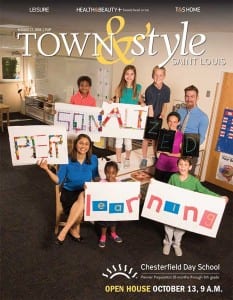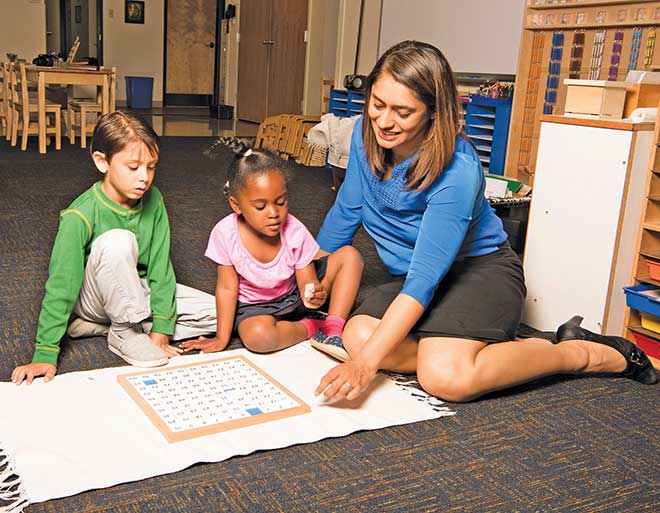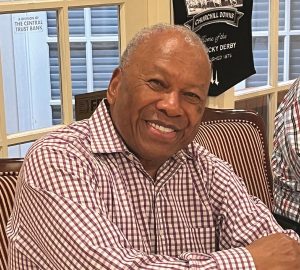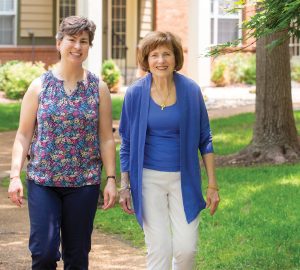Breakfast: the most important meal of the day. Especially at Chesterfield Day School (CDS), where it is prepared by pint-sized cooks who set the table, toast bread, cut fruit and pour cereal into real glass bowls. “When you are 18 months old, making your own breakfast is a huge and important life skill,” says head of school Rachana Creeth. Teaching skills like these and how to apply them in the day-to-day is at the center of Montessori thinking and what drives the CDS preschool program.
 Creeth explains that the preparation of breakfast demonstrates all four philosophical pillars of Montessori education—order, concentration, coordination and independence. “The children eat when they are hungry,” Creeth says. “We don’t tell them to eat, but we allow them to listen to their own bodies.” At CDS, this activity holds the same importance as learning the alphabet. Putting on a coat and holding a spoon correctly are skills as valuable as building a house out of blocks. “Layering like this builds a solid foundation for high executive functioning,” Creeth notes.
Creeth explains that the preparation of breakfast demonstrates all four philosophical pillars of Montessori education—order, concentration, coordination and independence. “The children eat when they are hungry,” Creeth says. “We don’t tell them to eat, but we allow them to listen to their own bodies.” At CDS, this activity holds the same importance as learning the alphabet. Putting on a coat and holding a spoon correctly are skills as valuable as building a house out of blocks. “Layering like this builds a solid foundation for high executive functioning,” Creeth notes.
In second grade, teaching switches to other methods using project-based learning (PBL) to solve problems and address challenges. This is the vein that runs through the curriculum, as is Singapore Math, an approach that focuses on math mastery rather than memorization. “We move away from the mechanics of doing and toward higher order thinking. We want students to be able to solve problems they don’t know exist yet,” Creeth explains. During project-based learning sessions, children work collaboratively toward common goals, learning how to conduct interviews, hold meetings, resolve conflicts, use their hands and complete assignments.
Creeth stresses that teaching at CDS is highly personalized. “We truly allow each child gifted in a particular area to be challenged where they are,” she says. “We nudge them along individually to reach their full potential. Everyone is on their own track.” This means there’s a lot of physical movement in the classroom as teachers go from student to student. “You’ll never walk in and see a whole class having one lesson. You’ll see conversations, not lectures,” she adds. Learning takes place all the time—in the hallway, around a lunch table, over a bowl of Cheerios. Children learn how to hold a spoon, how to greet people, how to have a conversation when there are differences of opinion. “We seize the moments to foster grace and courtesy in our young people,” Creeth says.
She became head of school last year, having served as the school’s business manager since 2010. All three of her children have gone through the Montessori program there. Although Creeth comes from a corporate background, she says her passion is education. “At CDS, we believe in the whole child, and we place great value on building capable, well-adjusted children of strong character. Educated young adults are our future,” Creeth says.
CDS, which goes through sixth grade, was founded in 1962. It currently has 150 students but is adding 20 more spots this fall to meet the demand for entrance.
Pictured: Chesterfield Day School students with head of school Rachana Creeth.
Photo: Tim Parker Photography
Chesterfield Day School provides a personalized education for students of diverse backgrounds, emphasizing critical thinking, problem-solving and good character. For more information, call 314.469.6622 or visit chesterfielddayschool.org.
Cover design by Julie Streiler | Cover photo by Tim Parker Photography








